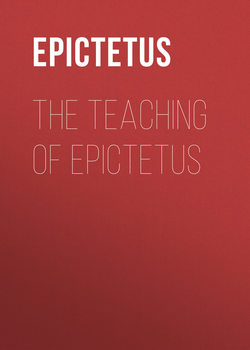Читать книгу The Teaching of Epictetus - Epictetus - Страница 5
BOOK I
CHAPTER III
the master-faculty
Оглавление1. Of all our faculties ye shall find but one that can contemplate itself, or, therefore, approve or disapprove itself. How far hath grammar the power of contemplation? Only so far as to judge concerning letters. And music? Only so far as to judge concerning melodies. Doth any of them, then, contemplate itself? Not one. But when you have need to write to your friend, grammar will tell you how to write; but whether to write or not, grammar will not tell. And so with the musical art in the case of melodies; but whether it is now meet or not to sing or to play, music will not tell. What, then, will tell it? That faculty which both contemplates itself and all other things. And what is this? It is the faculty of Reason; for we have received none other which can consider itself – what it is, and what it can, and what it is worth – and all the other faculties as well. For what else is it that tells us that a golden thing is beautiful, since itself doth not? Clearly it is the faculty which makes use of appearances. What else is it that judges of music and grammar, and the other faculties, and proves their uses, and shows the fit occasions? None else than this.
2. Thus the Gods, as it was fit they should, place that only in our power which is the mightiest and master thing, the right use of appearances; but other things are not in our power. Was it that they did not wish it? I indeed think that had they been able they had made over to us those things also; but this they could in no way do. For being on the earth, and bound up with this flesh and with these associates, how was it possible that as regards these we should not be hindered by external things? But what saith Zeus? “Epictetus, if it were possible, I would have made both this thy little body and thy little property free and unhampered. But forget not now that this is but finely tempered clay, and nothing of thine own. And since I could not do this, I have given thee a part of ourselves, this power of desiring and disliking, and pursuing, avoiding, and rejecting, and, in brief, the use of appearances. Have a care, then, of this, hold this only for thine own, and thou shalt never be hindered or hampered, thou shalt not lament, thou shalt not blame, thou shalt never flatter any man.” What then? Do these seem trifling matters? God forbid. Are you, then, not content with them? At least I pray the Gods I may be.14
3. But now having one thing in our power to care for, and to cleave to, we rather choose to be careful of many things, and to bind ourselves to many things, even to the flesh, and to possessions, and to brother and friend, and child and slave. And being thus bound to many things, they lie heavy on us and drag us down. So, if the weather be not fair for sailing, we sit down distraught and are ever peering forth to see how stands the wind. It is north. And what is that to us? When will the west wind blow? When it shall seem good to it, friend; or to Æolus. For it was not thee, but Æolus whom God made “steward of the winds.”15 What then? It is right to devise how we may perfect the things that are our own, and to use the others as their nature is. And what, then, is their nature? As it may please God.
14
There is excellent MS. authority for this reading of the passage, which, however, is not Schweighäuser’s. The latter reads: “Be content with them, and pray to the Gods.”
15
“Steward of the winds.” A quotation from Homer, Od. x. 21.
